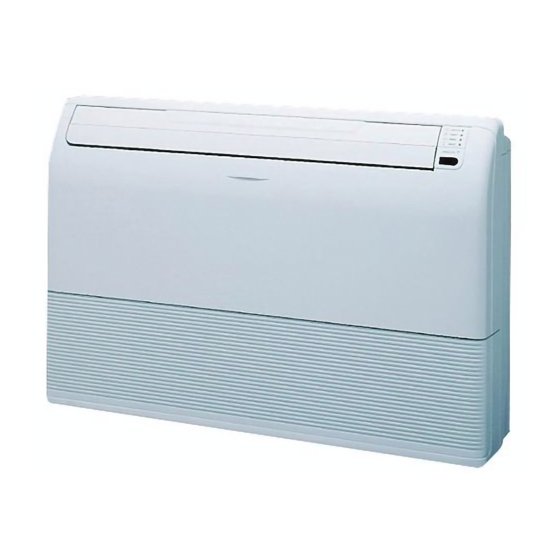Fujitsu ABT series Manuel d'utilisation - Page 17
Parcourez en ligne ou téléchargez le pdf Manuel d'utilisation pour {nom_de_la_catégorie} Fujitsu ABT series. Fujitsu ABT series 20 pages. Floor console/under ceiling dual type
Également pour Fujitsu ABT series : Manuel d'utilisation (18 pages), Manuel d'utilisation (20 pages), Manuel d'utilisation (20 pages)

Multi-type Air conditioner
This indoor unit can be connected to a multi-type outdoor unit. The multi-type air conditioner allows multiple indoor units to
be operated in multiple locations. The indoor units may be operated simultaneously, in accordance with their respective
output.
Simultaneous Use of Multiple Units
Instructions relating to inverter (
G When using a multi-type air conditioner, the multiple
indoor units can be operated simultaneously, but when
two or more indoor units of the same group are oper-
ated simultaneously, the heating and cooling efficiency
will be less than when a single indoor unit is used alone.
Accordingly, when you wish to use more than one in-
door unit for cooling at the same time, the use should
be concentrated at night and other times when less out-
put is required. In the same way, when multiple units
are used simultaneously for heating, it is recommended
that they be used in conjunction with other auxiliary
space heaters, as required.
G Seasonal and outdoor temperature conditions, the struc-
ture of the rooms and the number of persons present
may also result in differences of operating efficiency.
We recommend that you try various operating patterns
in order to confirm the level of heating and cooling out-
put provided by your units, and use the units in the way
that best matches your family's lifestyle.
G If you discover that one or more units delivers a low
level of cooling or heating during simultaneous opera-
tion, we recommend that you stop simultaneous opera-
tion of the multiple units.
G Operation cannot be done in the following different op-
❖
erating modes.
If the indoor unit is instructed to do an operating mode
that it cannot perform, the OPERATION indicator lamp
(green) on the indoor unit will flash (1 second on, 1 sec-
ond off) and the unit will go into the standby mode.
Heating mode and cooling mode (or dry mode)
Heating mode and fan mode
Notice
Instructions relating to heating (*) are applicable only to "HEAT & COOL MODEL" (Reverse Cycle).
*G During use of the heating mode, the outdoor unit will
occasionally commence the defrost operation for brief
periods. During the defrosting operation, if the user sets
the indoor unit for heating again, the defrosting mode
will continue, and the heating operation will begin after
completion of defrosting, with the result that some time
may be required before warm air is emitted.
❖
) are applicable only to "INVERTER MODEL".
G Operation can be done in the following different operat-
❖
ing modes.
Cooling mode and dry mode
Cooling mode and fan mode
Dry mode and fan mode
G The operating mode (heating mode or cooling (dry)
❖
mode) of the outdoor unit will be determined by the op-
erating mode of the indoor unit that was operated first.
If the indoor unit was started in fan mode, the operating
mode of the outdoor unit will not be determined.
For example, if indoor unit (A) was started in fan mode
and then indoor unit (B) was then operated in heating
mode, indoor unit (A) would temporarily start opera-
tion in fan mode but when indoor unit (B) started oper-
ating in heating mode, the OPERATION indicator lamp
(green) for indoor unit (A) would begin to flash (1 se-
cond on, 1 second off) and it would go into standby
mode. Indoor unit (B) would continue to operate in heat-
ing mode.
*G During use of the heating mode, the top of the indoor
unit may become warm, but this is due to the fact that
coolant is circulated through the indoor unit even when
it is stopped; it is not a malfunction.
16
